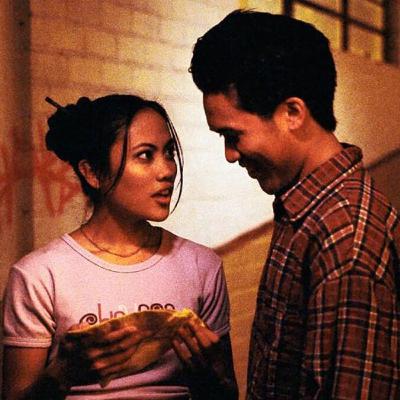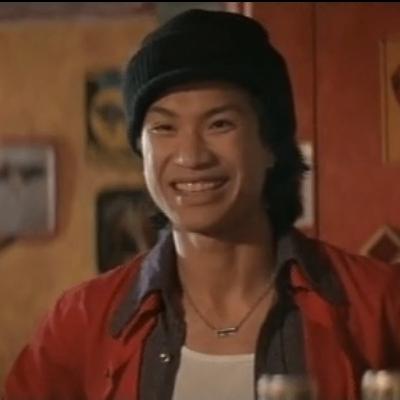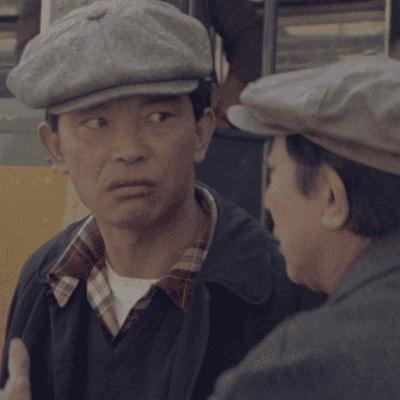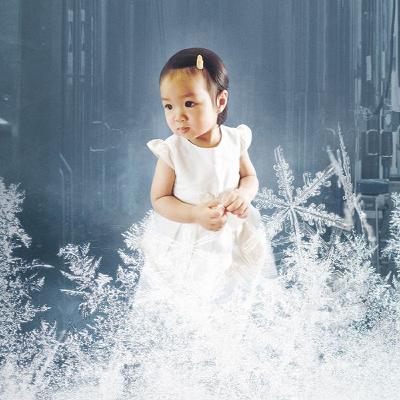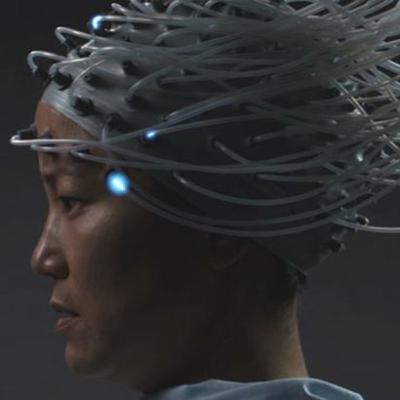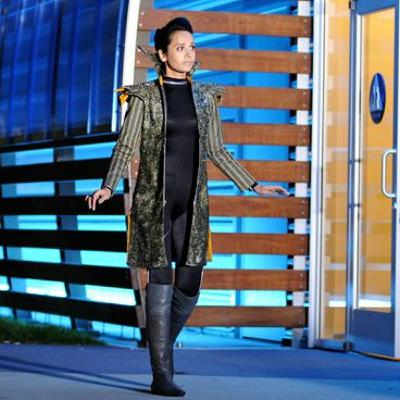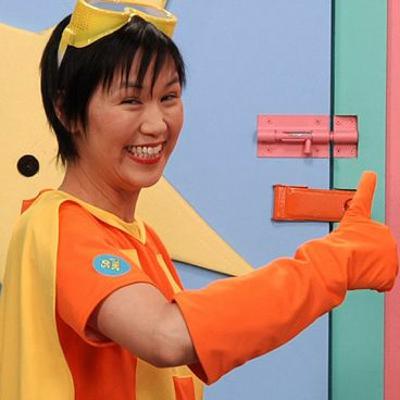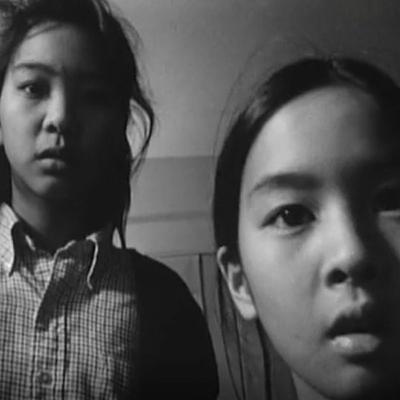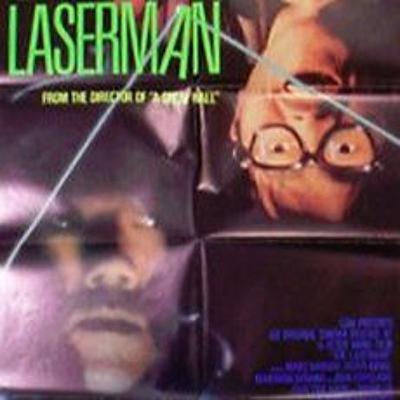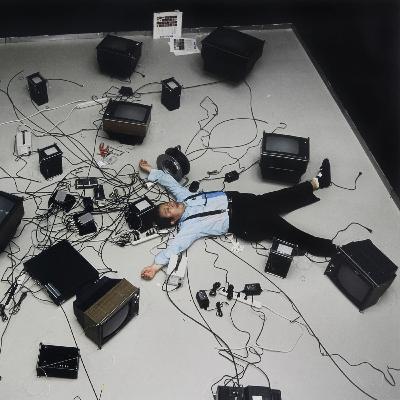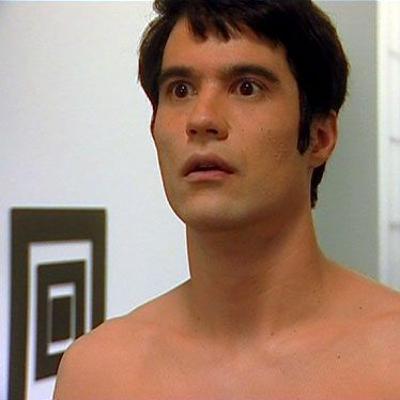Discover Saturday School Podcast
Saturday School Podcast

Saturday School Podcast
Author: Saturday School Podcast
Subscribed: 56Played: 336Subscribe
Share
© All rights reserved
Description
Wake up! Saturday School is a podcast where Brian Hu (@husbrian) and Ada Tseng (@adatseng) teach your unwilling children about Asian American pop culture history. New episodes released Saturdays at 8am, when all your friends are still in bed watching cartoons. It'll be a blast from the past, as they dig up some of their favorite works they've come across covering Asian American arts & entertainment over the years -- and discover other gems for the first time. Saturday School is a proud founding member of Potluck, a collective of podcasts featuring unique stories and voices from the Asian American community. Sign up for our newsletter below for lecture notes!
96 Episodes
Reverse
It's our final episode of our 9th season of Saturday School, which covers "Stars of Asian American Cinema." Before YouTube, if you wanted to see an abundance of stories with Asian Americans as stars, you'd have to go to an Asian American film festival. And there, we had our own stars who would walk down our own red carpets and get standing ovations at our own screenings (regardless of whether Hollywood took notice). For the last 9 episodes, we've been paying tribute to some of the regulars of that scene -- and if we missed anyone, chances are they are in our season-concluding film, 2007's "Finishing the Game," directed by Justin Lin. To guide us through this 1970s-set mockumentary which follows a casting call for a new stand-in for Bruce Lee, we have a special guest! We welcome Phil Yu, our fellow Potluck Podcast Collective member who hosts They Call Us Bruce, All The Asians on Star Trek and the official "Squid Game" podcast. You might also know him as the blogger behind Angry Asian Man and the co-author of "Rise: A Pop History of Asian America from the Nineties to Now." But guess what, he was also an extra in "Finishing the Game" who shows up for 1 second just before the credits. "Finishing the Game," at its heart, is about all the pre-2010s anxiety about what we would need in order to have an Asian American leading man in Hollywood. Not a loveable sweetheart (like Sung Kang's character in the film), a serious actor (like Dustin Nguyen's character), reliable B-Lister (like Roger Fan's character) or Asian star visiting from a foreign country (like Leonardo Nam's character), but a bankable Asian American Hollywood star who could greenlight a film and get the screaming fans to show up. At the time, it was almost unimaginable. But now, we can see why it was so important that we continued -- and continue -- to imagine.
This week's Saturday School episode is a celebration of Tsai Chin, as we revisit the 2019 film, "Lucky Grandma," directed by Saisie Sealey.Some might know Chin as a classically-trained theater actress and original star of the London "The World of Suzie Wong" stage show. Some might remember her as a Bond girl. Many likely think of her as Auntie Lindo in "The Joy Luck Club."But "Lucky Grandma" gave Chin the role of a lifetime. Now 91, she was in her mid-80s when she played the cranky, chain-smoking grandma who gets herself mixed up in a gang-related heist on the bus ride back from a trip to a NY Chinatown casino. The film's national commercial release coincided with the pandemic, alongside the rise of hate crimes targeting Asian American seniors. "Lucky Grandma" provided a free-wheeling fantasy of an old Asian lady trying to get away with the perfect crime, despite having no skills, smarts nor plan. We root for our star, who is only armed with judgmental stares, lack of empathy and brazen stubbornness. As the tagline says: Respect your elders.
For this week's Saturday School, the 8th out of our 10-episode semester on Stars of Asian American Cinema, we are talking about Viet Nguyen's 2015 horror comedy "Crush The Skull." It's co-written by Nguyen and Chris Dinh, who also stars in the film. It also features a memorable performance by Tim Chiou -- and to whoever did the lighting for their arm muscles, good work. But we can't talk about Chris Dinh, the action/comedy/horror/romantic lead in an award-winning indie film, without contextualizing his stardom as a product of two worlds colliding. By the late-2000s, Asian American independent cinema was joined by a fresh crop of YouTube stars, including Wong Fu Productions, who had movie ambitions of their own.
This week, we're revisiting the 2009 film "Karma Calling" by Sarba Das. It's a rom-com between a young Indian American woman Sonal Raj (Bernali Das) in Hoboken, New Jersey and an Indian man Rohit Rao (Samrat Chakrabarti) who works at a call center in Mumbai but is pretending to be an American named Rob Roy from Connecticut.For this semester, which is about "Stars of Asian American Cinema," we are really leaning into our nostalgia and fondness for the actors who were everywhere in the 2000s and 2010s Asian American film festival scene. Maybe they weren't always the leads in Hollywood films, but they looked like stars, carried themselves like stars and could nail the grand onscreen romantic gesture like stars. Samrat Chakrabarti was like this, and "Karma Calling" also features early performances from other fan favorites including Parvesh Cheena, Poorna Jagannathan, Manish Dayal, Rizwan Manji and more.
In this week's Saturday School episode, we revisit the 2004 Alice Wu film "Saving Face," on the tail of its 20th anniversary.If you've been following this semester, you know we are paying tribute to the "Stars of Asian American Cinema." This episode is our PhD thesis for why Lynn Chen is the ultimate star of Asian American cinema. We also talk about how "Saving Face" has become canon as it continues to gain new viewers over the decades. We marvel over how Joan Chen reversed aged by playing a mom of a pre-teen in "Didi." And we appreciate Michelle Krusiec for showing us that ABCs with non-fluent Mandarin can be nominated in the same Golden Horse Award category as Shu Qi!
In this week's episode, we're revisiting Gene Cajayon's 2000 film "The Debut," starring Dante Basco and Joy Bisco! Also starring Bernadette Balagtas! Eddie Garcia, Tirso Cruz III and Gina Alajar! Darion, Dion and Derek Basco! Premiere! DJ E-Man and DJ Icy Ice! Traditional Filipino Culture Night choreography! Trays and trays of food! Hip hop dance offs! Basically, Brian and I are jealous of Filipino parties, and we love that "The Debut" gave us an Asian American version of the classic '90s teen rom-com. And we also love that the main character's angst -- torn between his white American high school party and his older sister's debutante ball -- quickly melts away once he realizes that his Filipino family is much cooler and his sister's friends are much hotter.
This week, we are revisting 1999's "ABCD," directed by Krutin Patel. It stars Sheetal Sheth and Faran Tahir as Indian American siblings, aka the "American Born Confused Desis" of the title. Madhur Jaffrey plays their mom, who has many opinions about who her kids should marry, and Aasif Mandvi (of "The Daily Show" fame) plays Sheetal Sheth's charming immigrant love interest.The late '90s and early 2000s were a prolific time for indie Indian American films exploring the second-gen experience, with "ABCD," "American Chai" (which also starred Sheetal and Aasif), "American Desi" (which featured Kal Penn), and "Chutney Popcorn" (another great comedy by Nisha Ganatra that we covered in a previous season).To contextualize, these films are all pre-"Bend It Like Beckham" (2002) and pre-"The Office" (2005-13), aka before the rise of Mindy Kaling. For this generation, Sheetal Sheth is the OG star who provided a much-appreciated image of a modern, rebellious, confident Indian American woman onscreen.
Episode 3 of Saturday Season Semester 9 -- where we bask in the glow of our "Stars of Asian American Cinema" -- takes us back to the '90s. 1998's "Hundred Percent," directed by Eric Koyanagi, came out post-"Joy Luck Club," as Asian American filmmakers were experimenting with style, shedding the burden of representation and embracing hotness + silliness. There are three main storylines. A Venice cafe owner (the sweet and smiley Dustin Nguyen) crushes on a mysterious New Yorker (Tamlyn Tomita), who is on the run from a toxic ex-boyfriend. An aspiring actor (Garrett Wang) deals poorly with the stressors of being an Asian male actor in the '90s and puts his relationship with girlfriend (Lindsay Price) at risk. Two wannabe-Rastafarian potheads (Darion Basco and Keiko Agenda) accidentally get caught up in some criminal shenanigans. It's out of print, so we watched it on a DVD Brian kept from 2006. But there are four university libraries that carry it: UC Irvine, UC Santa Cruz, Sarah Lawrence and Tufts. (Shout out to universities with impressive Asian American media collections.)
Episode 2 of our "Stars of Asian American Cinema" season goes back to the beginning with 1980's "Hito Hata: Raise the Banner," considered the first feature-length film made by and about Asian Americans. It was recently restored in 4K by the National Film Preservation Foundation. The film traces Japanese American history from the issei generation's arrival to the U.S., to incarceration during WWII, to their fight against gentrification in Little Tokyo in the '70s. "Hito Hata" stars Mako (an Oscar-nominated actor who was one of the founders of the Asian American theater company East West Players) and Pat Morita (who got famous from "Happy Days" and would later become Mr. Miyagi in "The Karate Kid"). The film was directed by Robert A. Nakamura and Duane Kubo, founders of Visual Communications, the organization behind the L.A. Asian Pacific Film Festival, and it symbolized an investment in Little Tokyo as a cultural hub for Asian America. For this generation, stardom wasn't just about fame or celebrity. It was about dignity. "Hito Hata" showed that a cast of Asian American actors who were usually limited to bit parts in Hollywood could be stars. It also used stardom to teach a history that wasn't taught in schools.
Saturday School is officially back for Season 9! Brian and I are here to teach your unwilling children about Asian American pop culture history (which includes Russell Wong and watermelons). The theme for this semester is "Stars of Asian American Cinema." In recent years, it's been fun to see Asian Americans starring in Hollywood hits and winning prestigious awards, because for so many years, we were told that the reason Hollywood wouldn't make any Asian American films was because there were no bankable stars. But as longtime followers of the Asian American indie film scene, we had our own stars -- those who we could count on to shine on the big screens of Asian American film festivals, even if they never landed on the covers of Entertainment Weekly. We start this season with "The Joy Luck Club," not because it's a groundbreaking Hollywood studio film, but to remind ourselves that when the film came out, none of them were considered "stars." But looking back at it 31 years later, it's a parade of stars-in-the-making. Yes, it's a meaningful story about mothers and daughters, immigrant struggle and intergenerational trauma -- but also everyone is very vulnerably charismatic, joyfully campy or entertainingly villainous. And it's ridiculous that Tamlyn Tomita, Ming-Na Wen, Lauren Tom and Rosalind Chao still kinda look the same.
We’ve arrived at the last episode of Saturday School Season 8, which explored the history of Asian American sci-fi films! And we end this semester of boundary-pushing imagination with a… documentary! Pailin Wedel’s “Hope Frozen: A Quest to Live Twice” from 2018, which is available to watch on Netflix.“Hope Frozen” is about a Thai family who decide to have their two-year-old daughter Einz’s body cryogenically preserved in Arizona after she dies of brain cancer. Arguably an Asian American immigration story? While to some, it may seem like they're embarking on a fringe pseudoscience -- or alternately, that they're forcing their daughter to be a time traveler -- the film is a quiet mediation on family, love and grief. It's a scientific quest passed along from father to son (who of course is named Matrix) to accelerate, perhaps even invent, the technology to give Einz a second chance at life. She is the youngest cryopreserved patient to date.One of the reasons this season of sci-fi has been illuminating is because Asian American cinema often values authenticity, a natural reaction from a community that has seen their images distorted in Hollywood. But with recent films like "Everything Everywhere All At Once" and "After Yang," there seems to be a hunger for Asian American stories that may seem impossible or dare to rewrite the future. It’s been 6 years since we started Saturday School: Sept 8, 2016 to be exact. The landscape of Asian American cinema has changed a lot since then. Thanks for listening, reading and joining us on this journey!
Where were we going with a Saturday School season delving into the history of Asian American sci-fi? In some ways, all episodes prior were leading up to Jennifer Phang's "Advantageous," a 2015 feature film that started as a 2012 short film in the Futurestates series. Often, Asian Americans and other people of color in Hollywood sci-fi represent a post-racial future. But what if in near future, these inequities are not gone but intensified? Jacqueline Kim (who co-wrote the feature film expansion with Phang) plays Gwen, the spokesperson of a cosmetics company that wants to replace her with someone more "universal," just as she needs the money to send her daughter Jules (Samantha Kim) to an elite school. Gwen, a single mother, believes this is Jules' only shot at a decent future in a world where society is collapsing. So in order to keep her job, she volunteers to be one of the first subjects for a procedure that will transfer her consciousness into a new, younger (less-Asian) body. "Advantageous " won an award at Sundance, was nominated for an Independent Spirit Award and is available to watch on Netflix.
On this week’s Saturday School, we’re continuing our exploration of Asian American sci-fi with a second episode on Futurestates, a groundbreaking sci-fi short film series spearheaded by Karim Ahmad that ran from 2010 to 2014 on public television and online.Before Black Mirror was another anthology series set in the future, Futurestates gave directors – including many notable Asian American filmmakers - opportunities to tell unique stories that imagined the future. Last week, we looked at Greg Pak’s short films, and this week, we delve into Tanuj Chopra’s shorts “Pia” and “Teacher in a Box,” and J.P. Chan’s “Digital Antiquities.”“Pia” takes place in a futuristic San Francisco where robots are named Pia – and played by Pia Shah. “Teacher in a Box” explores a relationship between a teacher (Rebecca Hazlewood) and a student (Sarika Sanyal) who mostly converse through virtual reality but find reasons to connect in the real world. And “Digital Antiquities,” starring Jo Mei and Corey Hawkins, takes place in a future where CDs are antiquated and a man finds the only store that can help him decode the data his mom left for him after she died. Watching these shorts ten years later, many aspects of these stories seem uncannily similar to our current reality.
Throughout this season of Saturday School, we've been exploring the history of Asian American sci-fi films. So far, we've mostly focused on indie films from the 1980s to 2000s that overcame limited budgets and technologies to show what creative genre storytelling about Asian Americans could look like. Where was it leading? What would be possible if there was some organized funding around these stories? In 2010, the public TV and web series FutureStates, spearheaded by Karim Ahmad, commissioned filmmakers to create short films that imagined today's social issues in tomorrow's America. We're going to spend the next 3 episodes on FutureStates, starting with an interview with director Greg Pak, who was one of many Asian American directors who were asked to participate in the series. Greg Pak writes comics for both Marvel and DC - everything from the Hulk, Hercules, Darth Vader, Batman, Superman to Amadeus Cho. But because we are Saturday School, we spend all of our time talking to him about "Robot Stories" - which we started this season with! - and his FutureStates shorts. "Mister Green" stars Tim Kang as a government official who has failed to prevent the worst case scenarios of climate change. "Happy Fun Room" stars Cindy Cheung as a traumatized kids' show host trying (unsuccessfully) to warn the children of dangerous robot uprisings outside.
Before "Shang-Chi," before "Ms. Marvel," Asian American film gave us the superhero Lumpia Man. On the latest episode of Saturday School (where this season we're exploring Asian American sci-fi), we revisit "Lumpia" (2003) and its sequel "Lumpia with a Vengeance" (2020)."Lumpia" was shot in director Patricio Ginelsa's hometown of Daly City with his high school friends. In this comic book movie, narrated by Joy Bisco of "The Debut," the Americanized Filipinos are bullying the Filipino FOBs. But luckily, the FOBs are protected by Lumpia Man, a silent teenager whose weapon is lumpia. It's a charming time capsule of NorCal Fil-Am culture in the 90s, with the DJs, house parties, karaoke and K-mart. The home-made film developed enough of a cult following that Ginelsa ran a successful Kickstarter campaign to crowdfund a sequel about decades later. He got the old crew back together, added some trained actors (including Danny Trejo) and built out a larger "Lumpia" cinematic universe with a new generation of characters.
We're back to continue Season 8 of Saturday School, where we're exploring the roots of Asian American science fiction films.This week, we're thinking about movies like "Frankenstein," "Face/Off" or "Eyes Without a Face' -- plastic-surgery-gone-wrong films. So we are revisiting Pamela Tom's 1990 short film "Two Lies." It's from the point of view of a Chinese American teenager and her younger sister. Their mom recently left their dad, and she decides to get eyelid surgery as part of her "new grip on life." She's wearing sunglasses and secluding herself in the bathroom to hide the bandages around her eyes. She's dating a white man who's passionate about "the Orient" and calls her "Lotus Bud." She even talks differently. Is it a scientific experiment with horrific consequences, or just a regular procedure? As common as getting braces, their mother insists!
On Ep. 4 of Saturday School Season 8 (looking at Asian American sci-fi), we're talking about Shu Lea Cheang's 1994 experimental film, Fresh Kill. Shareen (Sarita Choudhury) and Claire (Erin McMurtry) are drawn into a corporate conspiracy when their daughter eats contaminated fish, her head glows green and she disappears. The same evil conglomerate controlling the internet & TV is also making radioactive cat food that is killing cats. But a sushi chef/hacker (Abraham Lim), a poet/dishwasher (José Zúñiga) and Claire's mom (Laurie Carlos), a public access host/activist, are working with them to expose the company.The film is written by Jessica Hagedorn, the playwright/author known for Dogeaters, and sometimes it feels like theater or spoken-word poetry. Other times it feels like someone with no attention span flipping through channels or TikTok/Instagram stories.Fresh Kill comes out of a time in 80s/90s New York when artists, activists, poets & filmmakers were trying to blow up categories of gender, sexuality and race. It was a time when casting people of color was called non-traditional casting. Another queer Asian American film of that time, Ang Lee's "The Wedding Banquet," is about negotiating with your parents. Fresh Kill negotiates with no one. It's available to watch online as part of the "My Sight is Lined with Visions" retrospective until Jan. 25.
This week on Saturday School, we continue our season on Asian American sci-fi with the 1988 film "The Laser Man." What happens when an immigrant actor/director (Peter Wang) who's been one of the faces of burgeoning Asian American cinema in the 1980s (with the seminal indie "Chan is Missing" and "A Great Wall," the first US feature to be shot in China) just wants to make a zany, nonsensical detective parody about killer lasers? And he brings together Asian American actors like Marc Hayashi (also of "Chan is Missing"), some famous connections in Hong Kong cinema (Tsui Hark, Tony Leung Ka-fai, Sally Yeh) and up-and-coming American filmmakers like Ernest Dickerson and Christine Vachon)?The result is something probably too strange and cringe-y for 1988, but arguably hilarious for 2021. Full of illogical hijinks and (we think) made-up Confucius sayings, this is another episode where we tell you about a movie you can't really watch because we want you to know that this happened. In 1988. With much more brazen confidence (to be weird) that we even get to see now in Asian America.
For Saturday School Season 8, we are exploring Asian American sci-fi films. In this episode we explore the genre's prehistory, diving into the robots, Buddha livestreams, and fantastic futures of video artist Nam June Paik. We took a field trip up to SFMOMA, which is presenting a massive retrospective of Paik's work, on display until October 3. Paik is considered the pioneer of video art, and is credited with coining the term "electronic superhighway" in 1974, basically predicting the internet. So for episode 2, we get lost in his vision of a technological future. He was all about breaking down barriers between low art and high art, bringing sexuality and shenanigans into classical music, and stitching together the real and the virtual, leading to such oddities as TV cellos, TV bras, TV glasses, TV chairs and TV gardens. As a Korean educated in Japan and Germany before coming to the U.S., he also resisted labels of nationality and proposed through his art a more utopic global vision of the future.
It's the year 2021. Asian Americans have survived the apocalypse, but as we emerge as a community blamed for the deadly virus, are we the villains, are we the misunderstood heroes or are we the robots? To help us figure it out, we're exploring Asian American sci-fi films for our 8th season of Saturday School.This is not a season about Hollywood sci-fi films with Asian Americans in it. For that, please listen to All The Asians On Star Trek, Marvel and Makeup, Nerds of Color -- anyone but Brian & I, who are laughably ignorant about a lot of mainstream sci-fi.We're looking at films where Asian Americans were the auteurs, so for the most part, indie films, experimental faire. Stories that imagine alternate versions of Asian America, dare us to break out of our boxes and think of other possibilities.We start this season talking about techno-Orientalism, how Hollywood sci-fi often portrays Asian spaces without any Asian people. Or if we exist, we are emerging superpowers to defeat. As a contrast to typical Hollywood sci-fi films, we begin our new season of Saturday School revisiting Greg Pak's 2003 film Robot Stories, "science fiction from the heart."Here, robots (and Asian Americans) are not something to fear; instead, something to love. Robots are the babies we are learning to take care of, a source of healing during a tragedy, the hero of the story who just needs a friend, and a way to connect with lost loved ones, even if it's complicated.







